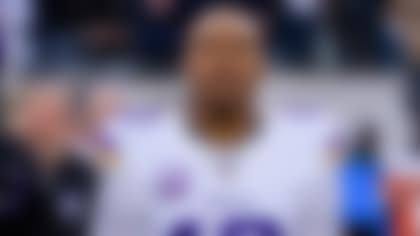NFL Network analysts Terrell Davis, LaDainian Tomlinson and Kurt Warner *will be enshrined in the Pro Football Hall of Fame on Saturday, along with fellow Class of 2017 members Morten Andersen, Jason Taylor, Kenny Easley and Jerry Jones. *
Davis, who played his entire seven-year career with the Denver Broncos, was critical to the franchise's run to back-to-back Super Bowl titles in the 1990s and was named MVP of Super Bowl XXXII. In 1998, he became the fourth player in NFL history to rush for more than 2,000 yards in a season. He also holds many Broncos team records, including most points in a season for a non-kicker (138), as well as career 100-yard rushing games (41) and rushing touchdowns (60).
In the months leading up to Saturday's enshrinement ceremony, notable names around the NFL, including some of Davis' colleagues and former teammates and coaches, shared stories and raved about the running back's Hall of Fame career.
FIRST IMPRESSION OF TERRELL DAVIS?
Corey Liuget (NFL player: 2011-present): I met him at Junior Seau's "Shop with a Jock" event. He was just a guy who was there, and I didn't know who he was at first. He was quiet and soft-spoken and didn't say much. Then someone told me that was Terrell Davis, and I went bananas.
Heath Evans (NFL player: 2001-2010 | NFL Network analyst): I think the thing about TD was patience and explosive burst. People knock running backs in that system because they all have 1,000 yards. Well, they don't all have 2,000. He always had a knack for, what we call in the running back room, press, press, press, stretch, stretch, stretch and then hit. He might have been the best at that. He would string the defense out, find a little gap and burst through it in ways that most people aren't capable of doing.
Steve Mariucci (NFL head coach: 1997-2005 | NFL Network analyst): Here's a guy who was out of Long Beach State, for crying out loud. He was under the radar. Transfers to Georgia -- took advantage of a situation where the [Long Beach State] program folded and he had to make a name for himself at Georgia, which he did. He still wasn't Herschel Walker. When he went to Denver as a sixth-rounder, he was a special teams guy, and the special teams coach was my buddy, Richard Smith. TD contributed covering kickoffs and making tackles on kickoffs. That's how he got their attention. He caught the coaches' eyes because he was a true "football player," meaning he wasn't a one-trick pony.
David Carr (NFL player: 2002-2012 | NFL Network analyst): I watched him a ton. He played with one of my favorite quarterbacks of all time, John Elway. I was a huge Terrell Davis fan, too, because I wanted them to win a Super Bowl. Everybody said he was a system guy, but he's a pretty good back. You'd see that when other backs were in and [the Broncos would] miss him on the field. You'd see that when he went out with migraines in the Super Bowl. They wanted him in the game because there's a threat that he might get the football. He's the first guy that I saw in that zone running scheme that was actually more than that. He took that scheme to another level. You can plug in a lot of guys who will do OK, but Terrell made them so much better. Elway should thank him for those two Super Bowls, because Terrell's the reason he won them.
Chris Harris Jr. (NFL player: 2011-present -- all with Broncos): My first impression is just that he always ran hard. And I'll always remember the Mile High Salute. I think he kind of started that. ... He was a complete back. He didn't catch the ball too much, but he was always running between the tackles, and it always took two or three guys to take him down.
Bucky Brooks (NFL player: 1994-'98 | NFL scout: 2000-'07 | NFL Network analyst): He was a problem. He's a big, fast, physical, downhill runner, and those attributes allowed him to attack the defense. [For me] as a safety, he was a nightmare. He was hard to tackle, and the synergy and connection between the Broncos' offensive line and Terrell made it nearly impossible to stop the offense when he was at his best.
LaDainian Tomlinson (NFL player: 2001-2011 | Hall of Fame Class of 2017 | NFL Network analyst): I just thought he was a hardcore beast, a guy that, when you gave him the ball, he was just going to turn out yards and punish people while doing it. It seemed to me that he relished contact, and it motivated him and energized him to keep going and break the will of a defense. So when I first saw him, I remember thinking, Man, I wouldn't want to tackle this dude. He's a beast.
Eric Kendricks (NFL player: 2015-present): My brother, Mychal, wore No. 30 [in college] because of Terrell Davis.
Will Blackmon (NFL player: 2006-present): When they told me the story about him running down on kickoff. A lot of guys come into the league and are like, I don't wanna play special teams or this or that. He's a great example to use to guys who want to come in and start right away. Sometimes, you have to take different paths, and the fact that he made a huge play and made an impression on his team, and then got an opportunity, that's huge.
Anthony Lynn (NFL player: 1993, '95-'99 | Davis' teammate: 3 seasons | NFL head coach, 2017-present): The first time I met Terrell, I was coming home from San Francisco, and I was supposed to compete with him. And we went through OTAs and minicamp, and coming out of that minicamp, I knew that, uh, I was destined to be his backup. He was the real deal. I was very impressed with his lateral agility.
Marshall Faulk (NFL player: 1994-2005 | Hall of Fame Class of 2011 | NFL Network analyst):Terrell Davis and I, our history goes back well before our pro careers. One of my games in college was against TD. He was at Long Beach State when I was at San Diego State, and that was kind of the first introduction that we had to one another. Lo and behold, years down the line, he eventually went to Georgia, and we both made it to the NFL. ... I told him this later on after we met, actually after we retired, part of what shaped my career and created drive for me was understanding what he went through to become the player that he was. Watching him win the Super Bowl, having a thought, watching the game, having a thought, thinking to myself, Why can't I do that? Why am I not in that situation? And then I started asking around about things I could do to get better, to become a more complete player, and just watching him have success on a personal level. But on a team level, it drove me to become a better player.
MOST MEMORABLE MOMENT OF DAVIS' CAREER?
Corey Liuget: When [the Broncos] beat Green Bay in the Super Bowl. Yeah, I was a Packers fan at the time, and I didn't like him.
Heath Evans: His Super Bowl runs. You see all of the stuff on NFL Films about his footage in the Super Bowl. That was a time when the Broncos depended on him, and I'm not taking anything away from John Elway, but that was a run-first team.
Steve Mariucci: The 2,000-yard season. The salute. Even more so than LT's teardrop, it was his thing. It was a patriotic thing and it was very cool. Football fans loved that. Americans loved that.
LaDainian Tomlinson: It was the Super Bowlwhen he had the migraines. It's the biggest game of his life, and the Super Bowl is a game that everybody watches in so many different countries. I remember tuning in being a big fan of his and seeing him having a great game and then leaving the game. I was thinking, What is going on? Why isn't he playing anymore? He's killing these guys. They reported on TV that he was having migraines. My wife has migraines, and I didn't know what they were at the time, but having gone through it with my wife and seeing that she gets sick and has these devastating headaches ... Knowing that he went through that and still was able to play and finish the game, that's what he will always be remembered for. And he was MVP. Unbelievable.
Chris Harris Jr.:The MVP year and [the Broncos] won the Super Bowl that same year. I think that was probably -- definitely -- one of the best years for a running back, especially for him at that time, because he was still growing as a player.
Bucky Brooks: His most memorable moment was how he performed against Green Bay in Super Bowl XXXII. We knew he was good and expected him to do good things, but he just took over the game. He was the catalyst of that offense -- because Terrell was there and ran effectively, it made them a tougher team to beat.
Kurt Warner (NFL player: 1994, '98-2009 | Hall of Fame Class of 2017 | NFL Network analyst): As a player, the first impression is just dominant. It was fun to watch him. He made it look so easy at times. I think the first impression when you meet him physically is how big he is. Even to this day, I'm still amazed when I look at him, and I ask him, "What do you do now?" He looks at me and says, "Man, I don't do anything. I don't even work out anymore." He's so gifted, but thick and strong.
WHAT DIFFERENTIATES HIM FROM OTHERS AT THE POSITION?
Reggie Wayne (NFL player: 2001-2014 | NFL Network analyst): He's what you call a workhorse. He's the one you look to when you want to get the job done. I never played against him, but just watching him on TV, there was nothing flashy about him, but he was what you call a grinder. He was a bowling ball of butcher knives. Guys always bounced off him, and it seems like every time he touched the ball, it was for positive yards.
Brian Baldinger (NFL player: 1982-1993 | NFL Network analyst): Like Gale Sayers, both of them had greatness compressed in a short period of time. He was the best back in the league for those four or five years. He had sheer power combined with speed. He could just truck people and also had the ability to just freeze guys. Defenders would miss and grab nothing but air.
Steve Mariucci: The length of time to prove that he belongs was shortened. It was harder for TD to be a Hall of Famer than a guy who played 12 years, because he had to cram all of that excellence into a handful of years. He did, and that's hard. It's usually a huge negative, but he was that impressive in that period that it warranted this induction.
Kurt Warner:The biggest thing when it comes to running backs is, it's all about vision. It's always about their ability to see things and that can show up in different ways. When I watch TD, they ran a certain kind of scheme where it was stretch, one cut and hit it. It was his ability to hit the biggest hole all the time. It was almost effortless, like he was gliding, then boom -- his foot's in the ground and he's up into the secondary. He just made it look so easy and smooth within that system.
Lance Moore (NFL player: 2006-2015): My buddies and I kind of have a running joke that guys who wear gloves with the fingers cut out are grinders. You know if the fingers are out, that he's a hard-nosed, tough, physical running back. I mean, he grinded out yards for those Broncos teams.
LaDainian Tomlinson: For one, his ability to cut at the last second. Some running backs cut too early and allow the defense to come off the block and tackle them. TD will wait until the very last second. It was almost like he was playing a game with the defender. He'd approach the defender and at the last second he'd put his foot in the ground. It was a little jump-cut, and boom -- he's through the hole. To me, that's what separated him, because a lot of running backs can't make the first guy miss. TD was always able to make the first guy miss. I don't think the first guy ever brought him down. And even beyond that, if TD didn't make him miss, he was running over him. He was going to plow right through him.
Willie McGinest (NFL player: 1994-2008 | NFL Network analyst): The system he was in, if [the defense] didn't get to where we needed to be, he was gonna let the play develop, read it and hit the hole. He was one of those guys where you're not going to arm-tackle him. He was one of the hardest running backs to tackle. He hit the hole at a certain speed. There wasn't a lot of dancing around.
Rashad Jennings (NFL player: 2009-present): He brings a certain type of energy to the game that can't be replicated.
Anthony Lynn: He has the stats. He won two championships. But he was the ultimate team player. I remember when I called to congratulate him, you know, he said, "We did it." And that, that's typical Terrell. It's never I or me. It was always we and us. He's the most unselfish player I have ever been around and one of the most intelligent players I have ever been around, but I just wish him all the best, because he is the best.
Jeremy Kerley (NFL player: 2011-present): He's a ground-and-pound runner. I'd say he's a ballhog in a good way. He always wants the ball, and to me, that's a guy you always want on your team.
Deion Sanders (NFL player: 1989-2000, '04-'05 | Hall of Fame Class of 2011 | NFL Network analyst): TD ran with a unique style. He had this natural body movement that showed he was going to fall forward and get more. He was with a wonderful team, even though he could eat wherever he went, but he had a great situation in Denver. Mike Shanahan knew exactly how to use him.
A PERSONAL STORY
A.J. Bouye (NFL player: 2013-'16): Everybody knows Terrell Davis. My rookie year, I was with coach [Gary] Kubiak, and he was saying to all the rookies that it all starts with special teams. The first play he showed us was Terrell's first tackle in the preseason [of his rookie season]. He came down on kickoff and just killed a guy. [Kubiak] was like, "Do you know who this is? He's going to go down as one of the greatest running backs of all time. He's going to be a Hall of Famer."
Reggie Wayne: I remember I first saw him when he was in the Super Bowl in Miami. His locker was actually my locker when they practiced at the University of Miami. That kind of blew me away a little bit. You know, like, Damn, Terrell Davis got my locker. I thought that was pretty cool.
Chris Harris Jr.: Ah, man -- we love when TD comes back [to Denver]. You can just see the running backs, they gravitate to him. He definitely gives us motivation, because they always rub two Super Bowls in our face, because we got one, but they always rub that second one in our face. They always give us that extra motivation to try go get another one, for sure.
Heath Evans: A couple of years ago, after Adrian Peterson had that 2,000-yard season, we were on air together arguing. I said, "Listen, if health isn't an issue, why wouldn't he do 2,000 yards again?" And TD goes, "I've had 2,000 yards, and I know how tough it is to put it back-to-back." Then he wraps up the segment with something like, "Obviously, I know more about rushing for 2,000 yards than Heath." It was such a good TV moment.
Brian Baldinger: Working with him over the last 10 years, you would never know he was a Hall of Fame running back. He'd be the same person whether he got inducted or not. I think there's something noble about that.
Ike Taylor (NFL player: 2003-2014 | NFL Network analyst): One of the hardest running backs to hit -- that's coming from my cornerbacks coach, Carnell Lake. He said that TD was "one brick muscle."
Bucky Brooks: Getting to know him at the NFL Network has been great. How he prepared as a player continued to follow him to help make a mark in TV. He has great attention to detail and he can relate complex schemes to the public. It's no surprise that he's had success in both.
LaDainian Tomlinson: We had kind of talked about it leading up to the Super Bowl when we were going to find out if we were gonna be voted in. I remember the first time we talked about it and TD said, "Yeah, I'm not getting in this year. You're going to get in and I'm gonna have to wait." I just remember feeling like that's so unfair, because this guy deserves it just as much as I do. So when [Hall of Fame] president Dave Baker knocked on my door and he tells me who else is in and said "Terrell Davis," I almost hit the floor. I was so happy, like it was me, because I knew what he was thinking. It was a great moment. We went downstairs and I saw he and Kurt in the ballroom, and TD and I embraced in a big hug. It was an unbelievable moment because we never thought we'd both make it.
Willie McGinest: When we were playing against each other, we talked about it long afterward, but TD looked up at me and said, "You're not a linebacker. You're a defensive end." Then he told the coach, "I'm not blocking him. That's a defensive end. We need to put a tackle on him." I was 265 or 270, so I was a bigger linebacker, and TD second-guessed the coach pretty much, like, "Are you sure that's the guy I'm blocking?" So, TD ended up cutting me. He was always going for the legs.
Donald Penn (NFL player: 2007-present): I remember growing up a Raider fan. You know, you see a lot of Broncos games, and some of those runs [Davis] used to put on my team back in the day, man, it really hurt me.
Rod Smith to Davis (NFL player: 1995-2006 | Davis' teammate: 7 seasons): Back in 1995, when we were in [Tokyo], you were a rookie my first year. We're trying to make the football team. We're both hungry. We're not getting any reps and were on special teams. We're running down on kickoff, running for our lives. I remember slipping my block, I got my eye on the returner, and all of a sudden, I'm knifing through and all of a sudden, a blur: No. 30 kills the guy, kills the returner. Mike Shanahan saw that. Put you on offense and you left me. Bro, you left me out there to fend for myself.
Kurt Warner: At the "NFL Honors" show [in 2016], both of us were on the loser's bus -- we jokingly had fun with it. We went over to the "Honors" show together, and it was funny, because we were talking about the Hall of Fame and how it works out and the fact that there's logjams. It was like he had a spreadsheet with him on how this whole thing was going to work out. He sat there and told me, "OK, here's how it's gonna work, Kurt. OK, you're going to get in next year. Me, I'm going to have to wait a couple years because LT will get in." So here we are at the NFL Honors before either of us are even inducted, and he has this whole theory on how all of this is going to play out. It's like looking at the schedule, like we're going to be 12-4 because of it. So I just sat back and laughed because I don't know how you even think you have an idea of how those voters operate. This was part of the reason that made it so cool this year when I found out that he made it, because in his mind, he had resigned himself to the fact that he wasn't going in this year but the next year. Our careers, to a large degree, parallel each other, so it was cool to get in together. But it was cool to see him rehash this conversation, like "You had this all wrong, my man."
WHAT SOLIDIFIED HIM AS A HALL OF FAMER?
Wade Phillips (NFL coach: 1976-2000, 2002-13, 2015-present): He was a low-round draft pick who burst on the scene and dominated. He was great in the regular season, but he really dominated in the playoffs when it really counted.
Brian Baldinger: The two Super Bowls really helped. John Elway was in this league for a long time and was as good a quarterback as we'd seen, but still hadn't won a Super Bowl. But Terrell put that team over the edge and showed everyone how important having a back like him is.
Steve Mariucci:Super Bowl wins are a team accomplishment, but they don't happen without Terrell Davis in Denver. Two thousand yards is in some ways a team accomplishment -- with the offensive line -- but that's so rare. You can't write the story of, "This one's for John," and all of that Denver Broncos history, without Terrell Davis. It doesn't happen. If John Elway is a Hall of Famer, Terrell Davis is one, too.
David Carr: I'm happy that he got in because of that. They say the Hall of Fame is about this long-lasting legacy, but you don't really have to. When there is a guy who's that talented and that good at football, I think you can see that kind of Hall of Fame talent in two years. We're blessed to have him for four or five good years, and it was fun to watch. But I don't think someone needs to play for 12 years to see if he's a Hall of Famer.
Chris Harris Jr.: The MVP, winning two Super Bowls. I think if you got those Super Bowls, and you made a lot of plays in those big games, then that kind of sets you apart, along with his Pro Bowls and All-Pros.
Lance Moore: It's probably as many yards he had in a short amount of time. If he wasn't cut short from injuries and stuff, I wonder what his numbers would look like if he had a 12-, 13-, 14-year career. He's definitely one of the toughest running backs of all time.
LaDainian Tomlinson: During the time he played, he was dominant: Two thousand yards and leading the league in rushing. Really, when people talk about John Elway winning the Super Bowl, it's because of Terrell Davis that they were able to win.
Kyle Shanahan (NFL head coach: 2017-present | Son of Davis' coach in Denver, Mike Shanahan): I always felt that Terrell Davis was one of the most underrated players of all time. It was really good to see him get in the Hall of Fame and get the recognition that he deserves. You know, the Denver Broncos, in my opinion, aren't close to winning those two Super Bowls without him. I mean, the run that he had -- I thought he carried those teams both years. Every year that he was there, he was the best running back in the league. And it was unfortunate that it got shortened by injuries, but, you know, when it comes to the outside zone -- and I know that there were some people who had success past him -- but no one was like Terrell. He was one of a kind, and I'm real happy for him that he got his due.
Steve Smith Sr. (NFL player: 2001-2016 | NFL Network analyst): It's just remarkable what he did in a short amount of time. He hit the ground running. When he got his opportunity, there's no turning back. What Denver got out of him when they named him the starting running back, they're still searching for that.
WHAT LASTING IMPRESSION DID HE HAVE ON THE NFL?
Kurt Warner: His lasting impression is tied to John Elway. So many people know John and how great he was, playing in five Super Bowls, and many argue that he's one of the best quarterbacks to ever play the game. I think where TD gets locked in with him is that John never won a Super Bowl until he had TD and that running game. I think that's what helped people to really recognize Terrell Davis. As great as John was, TD was the difference-maker that made the Broncos a back-to-back Super Bowl-winning team, whether it was dominating running the football or whether that was to complement John in a way he hadn't been complemented before.
Willie McGinest: He played in one of the best run offenses. Any time you're Super Bowl MVP and played the way you did, you have to give him respect. That offense was based around the run and predicated on how he ran the football.
Heath Evans: If people look at that three- or four-year window of time, it was sheer dominance on his part. There aren't too many backs that can say, "For this period of time, I owned it." Some guys might have longevity, but there's peaks and valleys.
Brian Baldinger:You can't take anything for granted, because your career can be cut short. And maybe the next guy who has five or six great years could be a Hall of Famer if he does things the right way. It doesn't have to be the careers like Emmitt Smith or LaDainian Tomlinson, but those shortened careers can still end up in Canton.
Steve Mariucci: I think his story says that great players need to be great, but you can't take it for granted. Life in the NFL is short-lived. Make the best of every snap, every season, because you never know when it's going to end. He made the most of his short time in the league.
LaDainian Tomlinson: This is a guy that started out on special teams running down on kickoffs hitting people -- to be an All-Pro and now Hall of Famer ... I think it personifies what every player should be about: the team. If I have to run down on kickoffs to earn a spot, that's what I'm gonna do. But eventually, if you do the best job you can do, then other jobs open up. When you get your opportunity, you take full advantage. That's the lasting impression he'll have on players that know his story.
Will Blackmon: You don't have to play 12 to 15 years in order to get respect and be selected to the Hall of Fame. You just have to be effective and change the game while you're playing.
Deion Sanders:TD was that kind of guy who beat a lot of the odds. He didn't have it easy, but made it the hard way. And he made it hard for everyone once he made it.
Tyler Horka, Gregg Rosenthal and Anthony Smith contributed to the reporting for this piece.
Follow Brooke Cersosimo on Twitter @BCersosimo.












